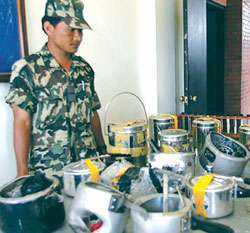 Between the abrupt dissolution of parliament in May 2002 and its restoration through the April Uprising this year, the RNA ran the country pretty much as its generals wished.
Between the abrupt dissolution of parliament in May 2002 and its restoration through the April Uprising this year, the RNA ran the country pretty much as its generals wished. Over all these years, the RNA has exercised a priority claim over the national exchequer. As the White Paper of Finance Minister Ram Sharan Mahat has conclusively shown, spiralling defence costs have driven the country to bankruptcy.
In effect, Nepal has been under undeclared martial law administered by a military-dominated unified command for the past four years. The army is complicit in every excessive use of force in suppressing the peaceful people's movement. The army chief should have resigned the day the mandate of the popular uprising was established. His refusal to shoulder moral responsibility seems to have put the government under tremendous pressure.
A judicial commission of enquiry is examining the excesses of the security forces during the people's movement. Based on its preliminary recommendations, the Inspector General of the Nepali Police Shyam Bhakta Thapa, Inspector General of the Armed Police Force Sahabir Thapa and National Investigation Department head Devi Ram Sharma have been suspended as it was suspected that they could have tampered with evidence had they remained in authority. But it's not clear why an exception has been made for the army chief. Prime Minister Girija Prasad Koirala seems to be repeating the mistake that his brother BP Koirala and friend KP Bhattarai committed in the 1950s and 1990: keep the RNA unchanged.
A carefully constructed myth exists in Kathmandu that the army is somehow infallible, immune from human failings and thus beyond scrutiny. This is the reason that its excesses escape largely unexamined. But when Pyar Jung Thapa and his deputy Rukmangad Katuwal 'briefed' Girija Prasad Koirala for hours prior to the implementation of the Raymajhi commission's recommendations it raised a very pertinent question: does this government have the courage to investigate human rights violations by the army or make it implement the decisions of the commission?
Will the RNA listen if the government decides defence spending needs to be cut to 1996 levels? These are the issues that need to be confronted rather than the removal of the 'royal' prefix from the army's name.
Any army is too big for a country where half the population is afflicted by chronic hunger and all its related pathologies. In absolute terms, the RNA is as big as the Bangladesh military, which has six times our population and a GDP nearly 11 times larger. With the combined strength of the army, the armed police and the police force at about 250,000, Nepal has one of the biggest internal security apparatus in proportion to its area and population. One in every 100 Nepali works for the security forces, but it hasn't made Nepal a more secure place. in fact, a bloated security machine is probably the reason we are insecure.
The Maoist menace is even more ominous. No one, not even its leaders have an exact idea about the number of their cadres carrying guns. It's estimated that only about 20,000 rebels have received some guerrilla training. The rest (about 30,000 others) can use explosives and arms. Even if a very small section of those were to decide to defect with their weapons, the seeds of many more future insurgencies will remain. the Jantantrik Tarai Mukti Morcha has already shown what it implies for the prospects of peace.
The army leaders must be brought to book if the rule of law is to prevail. There is no sense in the distorted logic that such a decision will adversely affect the morale of the force. Quite the contrary in fact, it will send a strong message to the RNA rank and file that the days of a golf-playing royal army is over. An army convinced of the sanctity of its purpose is an unconquerable force. The government needs to give that sense of purpose to our defence forces, not the concessions that some influential generals are said to be bargaining for.
Tackling the insurgents is no less tricky. The Maoists' weapons are a lot less risky than they are made out to be. Most are rudimentary arms looted from the police and the army. But enormous resources are needed to keep weapons of war functional during peacetime. Out-of-action guerrillas, however, remain lethal as long as they are not properly rehabilitated in society.
Koirala waits with a pair of scissors in his hand in front of a pressure cooker. There are two wires sticking out of the bomb: one black another red. He doesn't know which one is the active wire. Cutting both will eventually set off the bomb, as doing nothing most surely will. Cutting one carries half the chance of defusing the bomb with the risk that it may set off the device.
Like in the movies, it's time to cut one of the wires. Nobody need envy Koirala's quandary.



